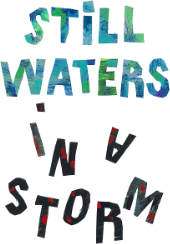Emma Brockes
I visited Still Waters unsure of what to expect and was blown away by the dynamic between the children and the teachers and volunteers. Those terms seem inadequate to describe the interaction between the adults and kids in the room. Without compromising authority or order, the adult leaders turned over the beginning of a thought or idea to the children, who were encouraged to unravel it as they saw fit. The results were funny, satirical, as grave as a New York Times editorial, slapstick, poetic, profound, surreal and thoroughly, thoroughly surprising. At work here was the radical assumption that the big ideas that underpin all good writing are within the grasp of even the youngest child, if the angle of entry is properly judged. Sure enough, the children spoke of racism, identity, politics and religion (“the character of God”, said one young contributor, with a sophistication for which you would commend a college student) with a natural and effervescent curiosity. Most strikingly, they spoke with the unfettered confidence that comes from a deep, deep sense of security. This, I think, was the most impressive aspect of Still Waters; the sense that, unlike so many learning environments, this was a place where they could think, speak, feel and create without fear of censorship or ridicule.
